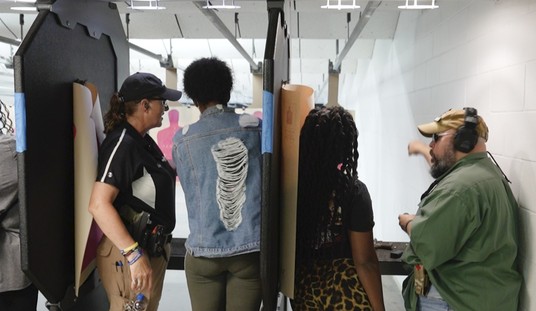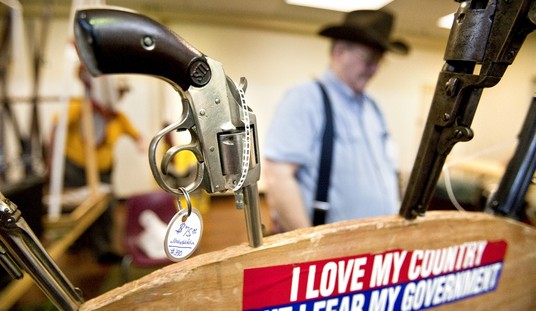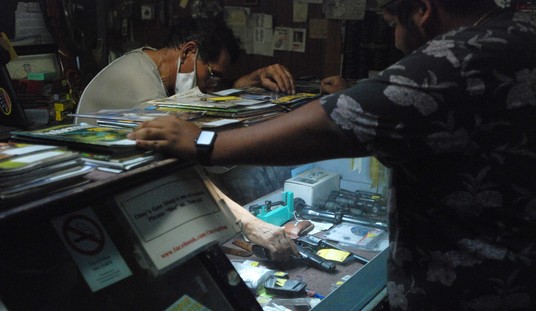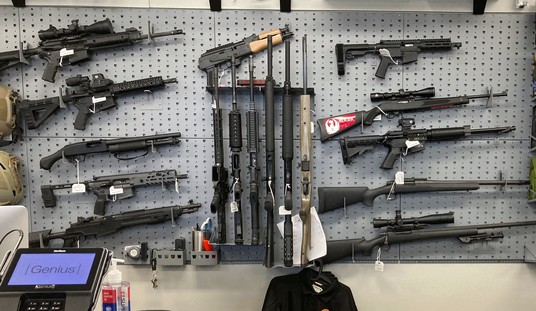Editor’s Note: This is Phil Jennings’ speech to students at Texas Tech University, March 12, 2011.
There is no shortage of books and articles chronicling the sometimes abysmal main stream media coverage of the Viet Nam War. To be more accurate, it was not the coverage per se but the biased and selective coverage and editorializing about the war that became abysmal, from the individual reporter, to the newsroom and on to the publisher and owners office. My brief talk today is about why, in my opinion, that happened and what the effect of the reporting means today. There is no doubt that a substantial element of the liberal American media, including print and television, became shills for the anti-war, anti-American crowd, sometimes with factual misrepresentations. Sometimes with propaganda. I am going to take the liberty of using “leftist” and “liberal” interchangeably here. I am also going to drop most “qualifiers.” I know that not ALL liberal media and all protesters against the war fit the same profile. One thing we do know is that enough did fit the leftist profile to change the course of the war.
The era of the Viet Nam War was a perfect storm. The combat was predicated on a flawed strategy, overseen by inept civilians. Our country was experiencing major civil unrest. Drug usage was skyrocketing with the infrastructure of distribution being built. The country began questioning its history and motives. The feminist movement and birth control fueled a ‘sexual revolution.’ The backlash from McCarthyism emboldened the left. The people of South Vietnam and their future became a secondary consideration in the prosecution of the war. There was a glimmer of sanity after Nixon was elected in a landslide—the first president to seem to put a priority on an issue that was killing American men—but that was quickly eclipsed by Watergate. The liberal American media had no trouble defenestrating Nixon. Teamed with a Democratic congress, the liberal media ended. And forfeited all we had paid for.
A limited war is a war of wills. A limited war begins with the concept of “leveling the playing field in war,” based on, among other things, the belief that it is morally repugnant for a greater power to use all of its resources on a lesser opponent. And the United States of America may be the most ill-equipped nation in history to win a limited war. We have military supremacy, certainly. But we are burdened with decency, compassion, a Judeo/Christian heritage (which some now want to deny), and a free press. And one of the greatest weapons a nation can have in a limited war is total control of the press. And if it can control, or at least influence, the enemy’s press……..You have Viet Nam.
If there is a central theme to my message, it is this: the civil liberty, anti-establishment, drug ingesting, sexual revolution, social and moral upheaval in America combined with a narcissistic relativism impacted and changed the conduct and outcome of the Viet Nam War, rather than the traditional theory of the war affecting America negatively—“tearing the country” apart as it was often said. I know all of you know what relativism is, but just in case let me remind you. Relativism is the concept that points of view have no absolute truth or validity, having subjective value according to differences in perception and consideration. In a relativistic world, Democracy cannot be better than Communism. It is also a fact that many of the anti-war leaders actively worked directly with communist organizations and countries. But that is a subject my colleague will explore in a few moments.
An era of a relativistic narcissism dominated liberal motives in America. A great deal of the post traumatic stress disorder seen in Viet Nam vets was not due to the change in them from their war experiences, but was in significant part due to the change in the social environment in the United States. The kerosene on the fire of this change was the American liberal media.
Why is the media influence on the prosecution and final outcome of the Viet Nam War important to understand? The answer is—because it is killing U.S. troops today. And in much the same manner as was done in Viet Nam.
Some may ask, isn’t it time to quit beating up on the media and their coverage of the Viet Nam War? Time to quit charbroiling Jane Fonda every time she opens her mouth? In a word—NO. The term media bashing itself is pejorative. Where is the bashing in pointing out the factual errors, the unethical bias and the sometimes anti-American propaganda in American journalism?
The damage done by the media and by those represented by Jane Fonda is deep, painful and long lasting. It affects the culture of our country, the country’s view of the world, and a very dangerous world’s view of us. It is causing death and destruction as we meet here. Among the many ways it does that—by spewing anti-American propaganda to the world, it unnecessarily prolongs our military involvement. By emphasizing our every blemish and error (Abu Grahib –Literally millions of lines of print) it makes our entire mission questionable. And by constantly questioning the depth of our commitment it frightens allies and emboldens foes. Is this so hard to understand?
John Del Vecchio, author and Viet Nam vet, in an essay called The Importance of Story, likened the culture of a country to an individual’s personality. The difference between a good personality and a bad personality is greatly due to how the person thinks of him or herself. Same with countries. Beginning sometime in the Viet Nam War a significant portion of the major media decided that it had higher moral standards than the U.S. government and by extension the U.S. population —“it was an unjust war.” My country, right or wrong, became my country, probably wrong. They decided, this American liberal media, that there was no such thing as American Exceptionalism. And they adopted a policy, a religion, of relativism—there is no right or wrong. The cynicism and arrogance is staggering. It has brought us a media which has the incredible arrogance to announce their impartiality in American affairs. G.K Chesterton said, “Impartiality is a pompous name for indifference, which is an elegant name for ignorance.” And I couldn’t agree with him more.
In my opinion it has brought us Political Correctness, the rope to hang ourselves that Vladimir Lenin talked about. The exercise of Political Correctness is the ultimate threat to our personal freedoms. Political Correctness is the opposite of free speech. Particularly when enforced by a biased media. I realize that I’ve made a rather big jump here—from biased reporting in Viet Nam to establishing Political Correctness in America. But yes, my belief is that the liberal media was emboldened and encouraged by one great fact: What the “left” found out in Viet Nam and after was that were no consequences, no accountability, and no retribution for factual errors, unethical bias and anti-American propaganda. They could question the morality of any situation without having to defend the morality of their own. They were aided and abetted by the great myths about the war they helped to start and continue to defend. An unjust war, unwinnable, American brutality, crazed and demented veterans, and all of the misrepresentations which made the Viet Nam war a “bad” war.
I realize that liberal American media, the television networks and national press, did not invent the protest movement—but it would be disingenuous to not recognize that without the media coverage, editorial support, news selection and emphasis, glamorization and legitimization therefrom, the protests would have been a relatively small part of the American landscape during the Viet Nam War. Let’s give them their due.. And in fact they won their Viet Nam. They shortened the American involvement in the Viet Nam War. So who should take credit for the slaughter of South Vietnamese, Laotians and Cambodians after the U.S. left?
Who was it that decided Abby Hoffman or David Dellinger or the average 19 year old college student knew more about the Viet Nam War and had a more accurate moral compass than our military? It was the American liberal media. Who was it that decided that our troops in Viet Nam were on a hopeless, helpless, foolhardy mission in Southeast Asia? The American liberal media.
Who was it that put Che Guevara and Mao tee-shirts on the unsuspecting and evidently uneducated youth, even today? The American Media. The American Media, beginning in earnest in the Viet Nam War, with a mantra of having an “open mind” and “impartiality” and “relativism,” legitimized communism. There were ebbs and flows of confrontations with the communists until Ronald Reagan buried the USSR, but by this time, to be a communist was about the same as belonging to another political party as far as the liberals in the U.S. media were concerned.
How was an army from a tyrannical communist government able to invade a neighboring country, slaughter hundreds of thousands of its citizens and overthrow its legitimate elected government and have the potential Savior of that country become the villain? Was it a spontaneous combustion in the minds of the world? Or was it constructed and honed by the American liberal media? Building on Russia’s vast propaganda machine—the leader of which called their propaganda victory in Viet Nam their greatest achievement.
How was a significant amount of young Americans convinced to follow the lead and rhetoric of a woman who once said—if you knew what communism was, you would fall on your knees and pray that we all become communists? Did the stupidity of that statement—starting with the fact that not a lot of communists actually pray—bother anyone in the peace movement? Or was there no one in the liberal media that knew that most Americans did know about communism and didn’t want to become communists?
I agreed and still agree with the media reporting on My Lai. Our soldiers did evil things and all must know that America won’t stand for such things. But the media negated any real concept of impartiality by the almost complete lack of reporting on Communist brutality. Those who say “yes, but the Americans should be held to higher standards” again suggests the paradox of the relativism of the liberal media—if there is no good side or bad side, why should we be held to a higher standard? And if there is a good side and bad side, how could you conscientiously support the bad side.
You can list every mistake every politician and military man made during the ten year war, yet still come to the conclusion that South Viet Nam was the very essence of a country to which America should pledge our help. If saving 20 million people from the most deadly sociological experiment in the history of the world is not worth our time and money, and, sadly, our blood, what is?
Why were most of the soldiers in the Viet Nam War volunteers? Could it have been their upbringing, their basic and innate desire to help those less fortunate? It’s true that as many as 250,000 mostly young people once gathered in Washington DC to protest the war. But more than two million men volunteered to travel to South Vietnam and fight the communists. A long weekend in our nation’s capital with wine, weed, and women, or twelve months in the Viet Nam jungle. In my experience, almost all Viet Nam combat participants supported the American tradition of assisting the oppressed. They believed John Kennedy’s call to go anywhere and share any burden.
I would be surprised if anyone here hasn’t heard about the Walter Cronkite statement on the futility of the Vietnam War after he made a visit there following Tet ’68. So he just all of a sudden got discouraged? Or was there a bias, a CBS bias against the prosecution of the war. Leslie Midgley was the Executive Producer of the CBS Evening News with Walter Cronkite. Let me read you some excerpts from his “memoir” called “How Many Words Do You Want?”
Midgley: I always did personally hold with Senator Wayne Morse who maintained loudly and constantly that we had no business in Viet Nam and that our operations there were illegal.”
Charles Collingwood, CBS Correspondent: The United States has been on the losing side in Vietnam from the beginning. We were on the losing side when we went in. We still are. 1964
Morley Safer, CBS Correspondent: “Morley Safer’s Vietnam….A Personal Report. The smell of green death is all part of Vietnam. All mixed up with beer and sweat and cheap perfume. The rest doesn’t get any more flattering.
Midgley again: In the late sixties, the living room war provided a constant supply of stark images of American boys fighting and dying in a dangerous swamp halfway around the world. These images, repeated over and over, blew up a rising tide of opposition to the war.”
Midgley: General Westmoreland maintains to this day (1989) that Tet was not a victory but actually a defeat for the Viet Cong.
Here’s what Spiro Agnew said in 1969: A small group of men numbering perhaps no more than a dozen anchormen, commentators, and executive producers settle upon the film and commentary that is to reach the public. They decide what 40 t0 50 million Americans will learn of the day’s events in the nation and the world. It’s time we questioned such power in the hands of a small an unelected elite.
Midgley’s response:
Agnew was right in saying that decisions about the news were made by a few people who possessed unusual power to make them. He was wrong in implying that the men who made the decisions were part of the “Eastern establishment” and were under the influence of some liberal bias which distorted their judgment. Acting on motivations of that sort is for politicians, not journalists.
Let me finish with an example of the recklessness, the bias, and the relativistic idiocy of the liberal media—the publication of the Pentagon Papers, a 7000 page document consisting solely of confidential material concerning the Viet Nam War. The project was “commissioned” by Defense Secretary Robert McNamara. Stolen by Daniel Ellsberg and given to anti-Viet Nam war reporter, Neil Sheehan, The New York Times and the Washington Post decided to publish a document which would help to cause the South Vietnamese people to fall under a ruthless, tyrannical government, the North Vietnamese. They did so even after the government of the United States, elected by the people of the United States, sued to stop the publication. After a number of judges, including Supreme Court justices said that in publishing the top secret documents, irreparable harm would be done to the government and to our troops in the fields. That it was not the most treasonable act in the history of the United States is perhaps only because the U.S., for political reasons, never declared war on North Viet Nam. The New York Times and Washington Post published top secrets documents that aided and abetted our enemy in time of war and suffered absolutely no punishment.
Proving the madness never stops, the U.S. State Department just recently announced they were supporting the distribution of the documentary film about the document thief Daniel Ellsberg. By the way, two of his current heroes? Julian Assange and PFC Bradley Manning.
And the connection between Ellsberg and Assange is the lack of any moral or ethical considerations about stealing confidential documents. It is America’s dilemma of not knowing what to do about Assange because it has been told for fifty years it is not a moral or exceptional country. The concept of freedom of information has been elevated to insanity status. Can you actually imagine a world of diplomacy, business, or social life where nothing is secret?
Let’s give the liberal press its relativism. But insist on asking “relative to what? Or who?” We are not a racist or brutal oppressive country compared to any other country at any time in the history of the world. Period. The least we could ask of our leaders is to acknowledge that fact.
If you believe America’s mission in Viet Nam was a noble cause. If you believe that a communist victory in South Viet Nam was a preventable disaster. Then the American liberal media helped the bad guys win. It’s as simple as that. And their “win” in South Viet Nam gave rise to the continuing difficulty in America’s ability to wage limited war, a seemingly non-ending part of the world’s future. And that leaves us with a continuing, and serious, dilemma—how to prosecute America’s wars with the burden of a liberal press.
I firmly believe that a free press is essential to democracy. Free from government intervention. Free from bias. Free from special interests. And free from ideologies which are detrimental to the health and well-being of the United States. I believe that common sense must be a staple of good government, including the common sense censorship of American military secrets and administrative secrets vital to diplomacy and, yes, espionage. That’s the easy part. The hard part is to elect leaders who the American people trust to have secrets. Viet Nam saw the wholesale destruction of that trust. We have to elect leaders who believe in America, its basic goodness and Exceptionalism.
A leader who doesn’t believe in America, what it was and what it is, leads to a relativistic view of one-world. America cannot afford to forfeit any more battles. America cannot afford a media so indifferent to America’s values, goals, or history that they declare themselves “impartial” when reporting on America’s conflicts and challenges. If an American citizen enlists in the military on behalf of another government, friend or foe, he can lose his citizenship. In Viet Nam the liberal media began an attack on the America that exceeded anything the communist propagandists (by their own admission) could fabricate and continues to this day. We ignore it at our peril.
Mr. Jennings is the author of The Politically Incorrect Guide to the Vietnam War. It’s the best $13 you will ever spend. Check it out here. ~Mike P.








Join the conversation as a VIP Member